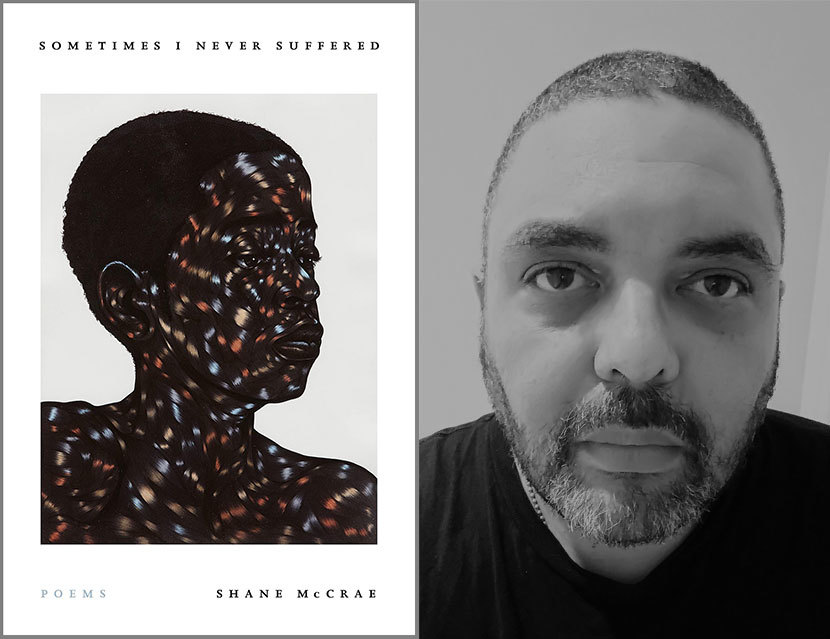
Our latest “Influences” guest post by a contemporary writer comes from poet Shane McCrae, whose work is included in the new Library of America anthology African American Poetry: 250 Years of Struggle and Song, edited by Kevin Young.
McCrae’s latest collection of poems, Sometimes I Never Suffered, was published in August by Farrar, Straus and Giroux. The subject of a rave review this week in the Los Angeles Review of Books, Sometimes I Never Suffered weaves religious, historical, and political themes into an elaborate tapestry that is partly narrated—from the afterlife—by a real-life historical figure: Jim Limber, the mixed-race adopted son of Confederate president Jefferson Davis.
In the column below, McCrae candidly describes his own grappling with “the anxiety of influence” as it pertained to a preeminent American poet.
By Shane McCrae
Thrasher Magazine produces a series of skateboarding videos under the group heading My War. In each video, the history of a particular skateboarder’s efforts to successfully complete a particular—and, usually, particularly difficult—trick is recounted. The videos range in length from three to almost twelve minutes. My war with John Ashbery lasted eight years.
I discovered Ashbery at a Media Play. For a brief moment when I was twenty years old, an instant, really—the Salem, Oregon, Media Play existed only for an instant, flashing into existence and almost the same day seeming to recognize the impossibility of its own existence, then melting away like the snowman I built on one of the four, or was it three, occasions it snowed during the seven years I lived in Round Rock, Texas, as a child, me weeping as the snowman melted, irretrievable even in its continued presence—Media Play was a heaven to me, its hintermost wall filled by shelves of poetry books, not the entire width of the wall, but a few yards of wall to the right of the center of the store, the hintermost right of the hintermost center, more poetry books than at any other bookstore in Salem. There, as I scanned the poetry section of what I could only assume, owing to a lack of confirming signage, was the book play part of the Media Play, I spotted, very early in my alphabetical journey, though not before Akhmatova, Ashbery’s And the Stars Were Shining—not his most recent book, that would have been the itself alphabetically organized Can You Hear, Bird?, but the book immediately previous to his most recent book—and, being twenty and a high school dropout, I was blown away by that initial and. What—except, you know, every instant of every life, though I hadn’t yet noticed that fact—begins with and?
And I opened and read it, I tried to read a poem in it, and immediately was lost, and didn’t buy it. But I remember no other books I engaged with at Media Play, my heaven, except for Susan Howe’s The Nonconformist’s Memorial and Richard Kenney’s The Invention of the Zero, both of which I bought. Ashbery, the bewilderer, stayed with me. And stayed with me.
A year later, at the Salem Borders—who would I be now if not for the chain bookstores of yesterday—while browsing through the fiction section, I discovered Carole Maso’s The American Woman in the Chinese Hat, which featured the following lines from Ashbery’s early “The Young Prince and the Young Princess,” uncollected until the Library of America’s publication of Ashbery’s Collected Poems 1956–1987:
I want you to examine this solid block of darkness
In which we are imprisoned. But you say, No,
You are tired. You turn over and sleep.
And I sleep, but in my sleep I hear horses carrying you away.
I thought those were some of the most beautiful lines I had ever read; I fell in love. Immediately, I started trying to imitate Ashbery. Fitfully, for the next eight years I continued trying to imitate Ashbery. I expect you to forget you ever saw this as soon as you’ve finished reading it, but this poem, titled “Love Poem About Architecture” and published here for the first time, never to be published again, was the kind of thing I wrote:
Like chickens, he let things die—
occasionally by killing them, but more often
he’d just be sitting down to lunch when I drove past, on the lookout for you,
and he’d knock on the window as if
I were inside a television. The farm spread out from there.
If you know Ashbery’s work well, maybe even if you only kind of know it, you can see in that poem things I ineptly borrowed from him. I ineptly borrowed from him until I started writing the poems that would become my first book, nine years after my mind was first expanded by his “and.” Now, I find myself returning again and again to Library of America’s two-volume Collected—by far the most comprehensive Ashbery collection in print—as well as to Ashbery’s later books. And yet, I admit, I’m still afraid when I sit down to read him—I struggled to not sound like Ashbery for years; I still feel as if he might overwhelm me. And in the end, I only managed the trick of not sounding like him by trying a new trick. The trick, it turns out, wasn’t to not sound like Ashbery—if that had been what I kept trying to do, I never would have pulled the trick off—the trick was to sound like myself.
Shane McCrae is the author of six books of poetry prior to this year’s Sometimes I Never Suffered. In addition to being included in Library of America’s African American Poetry anthology, his work was featured in The Best American Poetry in 2010 and 2019, and he has won a Lannan Literary Award, a Whiting Writer’s Award, the Anisfield-Wolf Award, a National Endowment for the Arts Fellowship, a Guggenheim Fellowship, and a NYSCA/NYFA Fellowship. McCrae lives in New York City, where he teaches at Columbia University.



